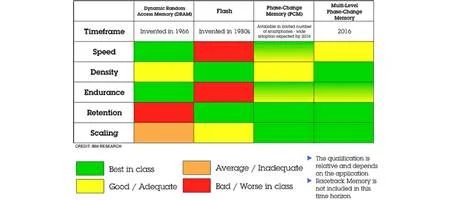IBM researchers have for the first time found a way of enabling phase-change memory to store data for longer, opening the way for low-cost, faster and more reliable memory applications.

Phase-change memory (PCM) is a non-volatile technology – it doesn’t require power to store data – that has a far superior performance to flash. It’s expected to find applications in consumer devices, including mobile phones and cloud storage, as well as high-performance applications such as enterprise data storage.
PCM can write and retrieve data 100 times faster than flash, enable high storage capacities and doesn’t lose data when the power is turned off. Unlike flash, it’s also very durable and can endure at least 10 million write cycles, compared to current enterprise-class flash at 30,000 cycles or consumer-class flash at 3,000 cycles.
“As organizations and consumers increasingly embrace cloud-computing models and services, whereby most of the data is stored and processed in the cloud, ever more powerful and efficient, yet affordable storage technologies are needed,” says Dr Haris Pozidis, manager of memory and probe technologies at IBM Research – Zurich.
“By demonstrating a multi-bit phase-change memory technology which achieves for the first time reliability levels akin to those required for enterprise applications, we made a big step towards enabling practical memory devices based on multi-bit PCM.”
Phase-change memory’s been on the verge or practicability for a little while now. A couple of weeks ago, a University of California, San Diego team demonstrated just such a device.
https://www.tgdaily.com/hardware-features/56363-phase-change-memory-device-knocks-ssds-off-their-perch
But a major problem has been what’s called short-term drift, which causes the stored resistance levels to shift over time, leading to read errors. Up to now, reliable retention of data has only been shown for single bit-per-cell PCM, and not in multi-bit PCM.
But the IBM researchers have been able to overcome this problem through a clever software trick that encodes the data in such a way that when it’s read out, they can correct for drift-based errors.
Using the technique, they were able to mitigate drift and demonstrate long- term retention of bits stored in a subarray of 200,000 cells of their PCM test chip, fabricated in 90-nanometer CMOS technology. It’s been working fine now for more than five months, indicating that multi-bit PCM can be reliable enough for practical applications.






